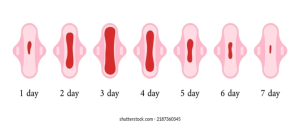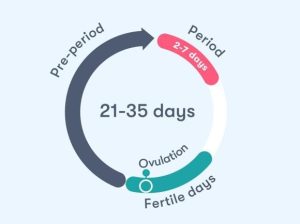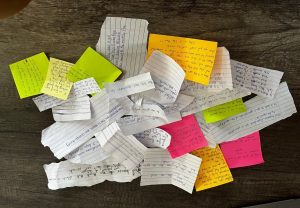By Emily Diaz
“What disease do you think affects a girl if she gets her period at 20 years?”
“Is it a must for a girl to have a menstruation?”
“If I get my period on the 2nd, and it comes back on the 5th of the next month, am I normal?”
Welcome to a compilation of curious questions stemming from our Ugandan community’s youth. Pictured above are around 20 of the hundreds of notes Reach A Hand conducted a peer learning session at a local high school, where our educators collected a variety of comments and questions all about menstruation, sexual health, and the continuous journey of development. Engaging in such a safe, open space where adolescent boys and girls could describe their inquiries about such topics is extremely vital for open, informative conversations in the exploration of womanhood.
Uganda is home to upwards of 9 million adolescents, where adolescent girls make up half of such at 5 million. A major part of the youth remains uninformed and without comprehensive discussions about the ways a girl can experience a healthy and safe period cycle. To catalyze the necessary change in perception of a girl’s development and pave the way for widened accessibility of menstrual health products, a shift in conversations to the girls gracefully transitioning into adolescence and adulthood must occur.
Young girls deserve to take care of their bodies confidently and appropriately using the knowledge from the beautiful, strong women surrounding them. The goal of this forum is to answer our community’s questions which stem from the youth between the ages of 13-17 years old going through developmental changes. Let’s dive into the origins of a woman’s period, unravel the intricacies of development, and leave any stigma behind to truly understand a young girl’s experience.

- What is a period?
A period is a normal process that occurs in women and girls each month. It is when the uterus sheds blood and tissue and leaves your body through the vagina. Menstrual bleeding comes from blood flow from the uterus, contrary to bleeding from an open wound. A period is also called a menstrual flow or menstruation!
- Why do girls menstruate and not boys?
Girls menstruate as a part of a woman’s reproductive life process. Each month, menstruation, also called a period, occurs!
Boys have a different reproductive system and do not have a uterus or ovaries.
- What is in menstrual blood?
Menstrual blood flow consists of blood, cervical mucus and vaginal secretions.
- What are signs of changes in a girl’s body through puberty?
Several changes throughout puberty include developing of breast buds, increase in acne on the skin, pubic hair growth and underarm hair growth are all signs of changes in puberty.
- When does puberty start for young girls? What is the first sign?
The stages of puberty begin around age 8. The first sign of puberty is breast budding or development. A young woman will usually have her first menstrual period 2 or 3 years after her breasts start to grow.
- Are there girls or women that do not menstruate?
Not all girls menstruate every month. Everybody is different! Each woman has their own individual reproductive system that works differently.
- At what age does menstruation start? At what age does it stop?
Menstruation usually begins around age 12. It can also start earlier or later than age 12, depending on a girl’s hormonal levels rising and falling.
Menstruation stops around age 45-55. This is when a woman’s body begins to experience menopause. Menopause is a natural part of aging and marks the end of a woman’s reproductive year.
- What happens if you do not notice puberty by age 13-16?
Delayed puberty in girls occurs when breasts have not developed by age 13 or periods do not begin by age 16. Possible reasons include hormone imbalance, lots of exercise, or underweight.
It is important to see a doctor to rule out any other conditions that may be affecting puberty!
- What makes a girl start their period “early”?
Your period will begin when your body is ready! An early period does not indicate a problem. Due to hormonal changes and genetics, periods can arrive sooner than expected.
- How long is a normal menstrual cycle?
A typical period lasts 2 to 7 days, where the heaviest bleeding occurs in the first 3 days. Some girls get their periods around every 3 weeks. Not all menstrual flows are regular, and flow can be different each month.
Some period flows can be shorter, while others can be longer and that is okay.

- How can I track my period?
There are many forms of counting the days of your period flow. To count the days, you can use an online menstrual calendar or app. Begin at the first day of your period and count the number of days your menstrual flow lasts.
Menstrual cycle beads can also help you count the days of your period flow and keep
track of the days in between.
Be sure to write down how you are feeling, how heavy or light your period flow is, and any other bodily changes you notice during each day of your period!
- How can I reduce cramps during menstruation?
Many girls experience cramps during their period flow, which is absolutely normal and part of the natural process. Cramps can be reduced by a warm heating pad or warm towel on the belly, pain-relieving medicine, and rest.
- Is it safe to have sex during my period?
Yes, it is safe to have sex during your period flow as long as you and your partner are comfortable with it. You can still become pregnant if you have sex while on your period. It is still important to use protection during this time.
- What is an irregular period?
An irregular period is when your period comes early, late, or not at all. An irregular period can also last longer than seven days.
Examples of irregular periods include:
- periods that are lighter or heavier than usual
- periods that last longer than seven days
- periods that are accompanied by severe pain, nausea, and vomiting.

It is normal to have differences in menstrual flow each month. If you sense severe changes in your menstrual cycle, keep records of your period flow and symptoms. It is important to share these with a trusted healthcare provider.
- Does an irregular period mean I am sick?
Irregular periods are very common! Even if your period cycle is not always predictable and varies slightly each month, that is still considered “regular”. At times, periods can skip months in between cycles in the first two years after your first period.

- What are appropriate products to use during my period?
- There are many ways to deal with period blood, but it is important to find which way works best for you.
- Girls can use a pad when they first get their period. They are made of cotton and can attach to the underwear.
- Girls can also use a tampon instead of a pad, especially when they are very active or playing sports. A tampon is a cotton plug that a girl inserts into her vagina using an applicator which absorbs the blood flow. You should not leave a tampon in for more than 8 hours because it can lead to toxic shock syndrome (TSS).
- Girls can also use a menstrual cup, which is inserted into the vagina. The menstrual cup holds the blood.
- What is vaginal discharge?
During ovulation once a month, the uterus produces vaginal discharge. Vaginal discharge is a clear, or white, stringy fluid that comes out of a girl’s vagina. It helps clean the vagina and fight off bad bacteria and infections.
Normal vaginal discharge should range from a watery, sticky to a thick texture.
If you notice a sudden change in your vaginal discharge smell, color, texture, or amount, contact a doctor as these changes could indicate a sign of infection.
- Does a pregnant woman menstruate?
No, pregnant women do not menstruate.
- How do I prepare for my first period?
If you are at school without a pad, tampon, or menstrual cup, ask a teacher or nurse you trust for one.
Period flows are nothing to be afraid or ashamed of! Young girls should talk to a parent or an adult you trust about what to expect.
Menstrual health matters! Not only for young girls and women, but for every community to enable their own to make healthy and informed decisions when it comes to their bodies. Period.
References
https://www.hopkinsmedicine.org/health/wellness-and-prevention/the-stages-of-puberty-for-girls
https://www.nhs.uk/conditions/periods/starting-periods/
https://www.plannedparenthood.org/planned-parenthood-orange-san-bernardino/about-us/blog/how-to-track-your-menstrual-cycle-without-an-app#:~:text=To%20do%20this%20you%20begin,this%20day%20as%20a%20reminder.
Article by Emily Diaz
